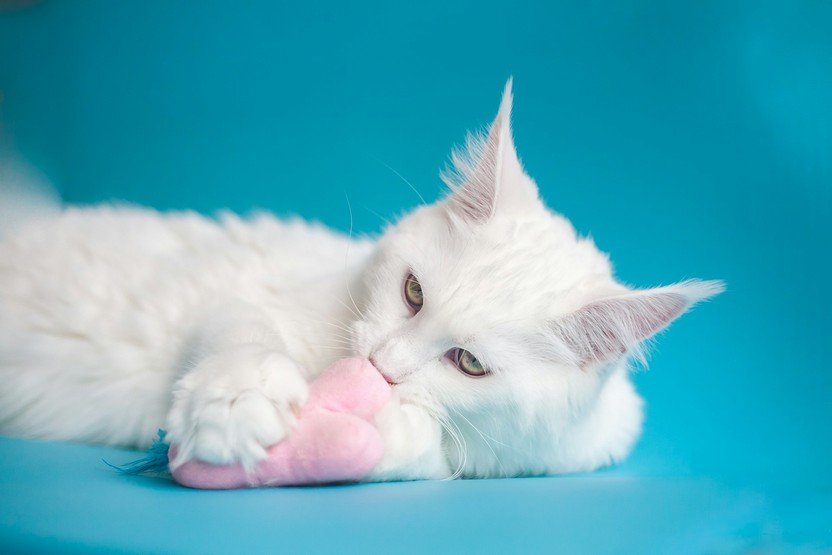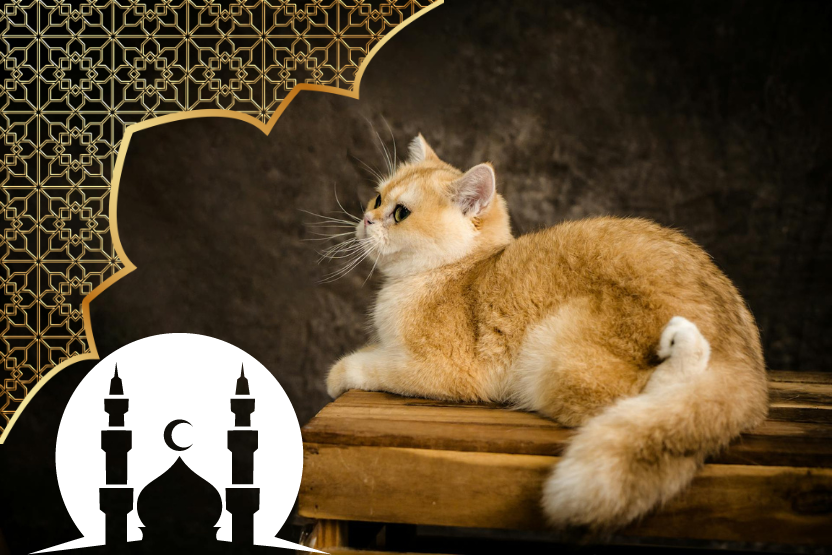🐈 Cats are considered, “Clean Pets” in Islam and are permitted to live “in-House” with their owners
They are naturally toilet trained and quite choosy in what they eat and where they eat. They clean themselves obsessively and care for their litter independently. Smart pets!
Hadith traditions tell us that Ayesha, RAA and Abu Huraira RAA had cats as house pets. In fact, Abu Huraira was named so because, Cat is Huraira in Arabic
Ruling on keeping cats Islam

It is permissible in Islam for a person to keep permissible things that no one else has taken possession of before him, such as taking firewood from the desert or wood from the forest. The same applies to taking cats and raising them. One takes possession of a permissible thing by acquiring it and having it under one’s care, provided that it does not belong to anyone.
Based on the above, we may say that there is nothing wrong with keeping cats which do not belong to anyone, on condition that one feeds them and does not torment them. But if it is proven that they cause some harm, such as if they are ill or one fears that they may transmit disease, then you should not keep them, because “there should be no harming nor reciprocating harm.” So whoever will be harmed by a cat’s presence should not keep one. Similarly, one who is not able to feed a cat should let it eat from the vermin of the earth and not keep it locked up, because of the report narrated by al-Bukhaari (3223) and Muslim (1507) from ‘Abd-Allaah ibn ‘Umar (may Allah be pleased with them both), according to which the Messenger of Allaah (peace and blessings of Allaah be upon him) said: “A woman was punished because of a cat which she kept locked up until it died, and she entered Hell because of it, because she did not feed it or give it water when she kept it locked up, neither did she let it eat from the vermin of the earth.”
With regard to cats eating food or drinking water, that does not make the food or water naajis (impure), because of the report narrated in Sunan Abi Dawood and elsewhere, which says that a woman brought some hareesa (a kind of food) to ‘Aa’ishah (may Allah be pleased with her) and found her praying. (‘Aa’ishah) gestured to her that she should put it down. Then a cat came and ate some of it. When ‘Aa’ishah had finished praying, she ate from where the cat had eaten and said, “The Messenger of Allah (peace and blessings of Allaah be upon him) said: ‘They (cats) are not naajis (impure), rather they are among those who go around among you (al-tawwaafeena ‘alaykum).’ I saw the Messenger of Allah (peace and blessings of Allaah be upon him) doing wudu’ with water from which a cat had drunk.”
According to another report narrated by Abu Dawood (68) from Kabshah bint Ka’b ibn Maalik, who was married to Ibn Abi Qutaadah, Abu Qutaadah entered and she poured some water for him to do wudoo’. A cat came and drank from the water, and he tipped the vessel for it so that it could drink. Kabshah said: “He saw me looking at him and he said, ‘Do you find it strange, O daughter of my brother?’ I said, ‘Yes.’ He said, ‘The Messenger of Allah (peace and blessings of Allaah be upon him) said, “They (cats) are not naajis (impure), rather they are among those who go around among you (al-tawwaafeena ‘alaykum).”’” These two reports were classed as saheeh by al-Bukhaari, al-Daaraqutni and others, as was stated in al-Talkhees by Ibn Hajar, 1/15.
“Those who go around among you (al-tawwaafeena ‘alaykum)” means that they are like servants who are with people in their houses, i.e., cats are always with people, in their houses and among their vessels and furnishings, etc., and this is something that cannot be helped.
So if a cat drinks from a vessel or eats some of the food, it does not become naajis (impure). The owner has the choice. If he is not put off or if he needs it, he may eat (the food) or drink (the water), because it is taahir (pure), unless it is obvious that it will cause harm. If he is put off by the idea of eating or drinking, then he may leave it.
But we should point out here that what some people do, paying a great deal of attention to their cats and beautifying them, spending large amounts of money on them, is indicative of a lack of common sense and religious commitment, and exaggeration with regard to leisure, when there are millions of needy Muslims all over the world, let alone the fact that we Muslims should pay attention to making the best use of our time and filling it with worthwhile and beneficial pursuits, far removed from this folly which has come to us from the kaafir west where some people spend more on their cats and dogs than they spend on their own sons and daughters, let alone the poor and needy. They may even bring their pets to stay in fancy hotels and bequeath large amounts of money to them. Praise be to Allaah Who has honoured us with Islam and distinguished us from all the other nations.
We should also point out that selling cats is not allowed, as was narrated in Saheeh Muslim (2933) from Abu’l-Zubayr who said: “I asked Jaabir about the price of a dog or a cat. He said, ‘The Prophet (peace and blessings of Allah be upon him) forbade that.’” And Allah knows best.
Source: Sheikh Muhammed Salih Al-Munajjid
The importance of cats in Islam
Many references to the cat are made in the Qur’an, reminding us, for example, that the water from which a cat has drunk can still be used by a believer to perform his ablutions, or that food left by a cat can still be consumed, because it is a clean animal and a predatory one.
He is considered a member of the house, and even its guardian. This would come from the fact that, among other anecdotes, the Prophet Mohammed was particularly attached to his pussy, Muezza, who saved him from the bite of a snake. Thus, while the latter was asleep at his side, he preferred to cut off his clothing rather than wake her up (cat owners will surely recognize themselves). It is also the one who would have given all cats the ability to always fall back on their feet. The animal appeared in Islam on Noah’s Ark, then infested with rats. The patriarch allegedly created the cat by rubbing his hand on a lion’s nose, which sneezed to reveal two cats, a male, and a female.
The cats would then have clawed and scratched the wood of the ark (indeed, nothing has changed since then). Noah would then have punished them by forcing them to stay on the upper deck, under the rain of the flood, hence the violent detestation of cats for water in general. Strangely, if the cat is a preserved and respected companion in many regions of Islam – it is considered a sin to harm this animal, which has a place in heaven – the phenomenon seems to be less pronounced in sub-Saharan Africa, where it meets with less love, despite the presence of this religion.
A cute, but above all useful animal

Thus, in the fertile crescent, the cat should not only be appreciated for its sweetness, but also because it protected agricultural stocks (grain silos were invaluable to these farmers), and not only. By hunting rats, the cat eliminated a vector of serious diseases (such as plague), and by hunting snakes (especially horned vipers), it made the surroundings of the households near where it had established its territory safer. That makes it easier to understand why he quickly created a place of choice in the hearts of humans.
Overall, 🐈cats hold a respected and valued position in Islamic culture, with teachings emphasizing kindness, care, and respect towards them.

